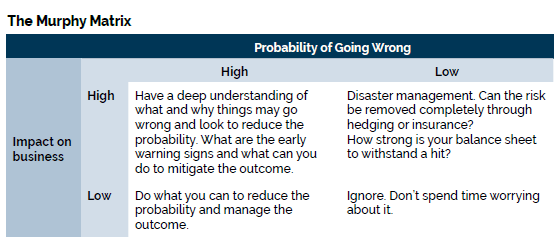Peter Flannery
There’s a bloke called Murphy, and he’s a right pain in the arse. Because of him, and his many laws things don’t always work out the way you plan. However, at least if you have a plan, even if it doesn’t work, over time you will get a better result than those who never had a plan in the first place.
Those who don’t have a plan will only get the default result. A manufactured or planned action will generally always deliver you a better outcome.
Apparently, there are three types of people in the world. Those who make it happen, those who watch it happen and those who wonder what happened. Personally, I think there is a fourth. Those who know what is happening. It is all very well being type One – those who make it happen – but, because there is so much outside of your control Murphy can still play havoc.
So, plan to make it happen, and that plan needs to have flexibility built in as a key component. You can’t be flexible without knowledge, and knowledge is power. There is a difference between making an early informed decision as opposed to making a knee jerk decision due to panic.
There is knowledge on all sorts of levels. A farming friend of mine once said at his field day it wasn’t until he stopped reading Rugby News and Penthouse and started reading farming magazines that his business really started to improve. That got a laugh from the 400 people attending. A salient message within the humour. A thirst for knowledge on a macro level helps you with your longer-term planning and decision making.
WHAT ABOUT ON FARM DECISION MAKING?
Do you know what’s happening? Dairy farmers measure milk production twice a day because of the nature of their system. Generally, they are also very good at measuring grass growth. Again, their farming system allows them to do that. Sheep and beef businesses can’t be as precise in those regards as their dairy farming cousins.
However, there are things that can be measured and things that can be observed. Weather stations and soil moisture probes can provide accurate information.
Weather forecasting is becoming more accurate. That will allow you know what is happening and help predict what is going to happen. Most farmers will know it is time to act when a particular ridge on their farm starts to dry off. But sadly, that probably falls into the ‘knowing what’s happened’ category.
Timing of decision making is key. It won’t always be the right decision in hindsight, but as I said, an early informed decision will generally win over an uninformed late decision. For example, your information tells you that you are going to run out of feed a month before it happens. So, you destock before anyone else starts to act. Cool. Then you get a month’s worth of warm gentle rain and you feel like a dick. It’s that bastard Murphy again. You just have to be flexible enough to work out the second-best way to make money from the surplus feed. Compare that to the farmer who did nothing, and it didn’t rain, and was left with the soul-destroying sight of hungry stock on brown paddocks and getting hammered at the sale yards.
As I said to a client as Covid-19 was impacting on schedules and killing space, farming is not for the faint-hearted. You need knowledge of a wide range of things and then courage to act in accordance of that knowledge, and confidence to be prepared to do something different if required.
WHAT ABOUT YOUR WORKLOAD?
There is a saying – the difference between an average farmer and a good farmer is three weeks. Spring is a chaotic time with workload, and changeable unreliable spring weather doesn’t help. At what point do you realise you need to move to Plan B?
If you haven’t got time to sow the swedes or new grass yourself do you wait, or do you get help? Do you pick up the phone to ring the contractor two weeks after everyone else or do you read the signs and ring two weeks before everyone else. What are the key dates in your farming calendar that prompt you to commit to Plan A or Plan B. Be flexible in your plan, but firm on your trigger points.
As I said at the start, Murphy is a right pain in the arse, but he can be thwarted to a degree. If anything can go wrong, it will. So, have a think about what can go wrong. How likely is it that it will go wrong and what is the impact of that on your business? If it is unlikely to go wrong and if the impact on your business is insignificant, don’t worry about it.
Conversely if it is quite probable and the impact significant, then how do you mitigate? How do you reduce the probability and how do you reduce the impact if it does go wrong? If you haven’t even thought about what could go wrong, Murphy will certainly find them for you. To help thwart Murphy, try using the Murphy Matrix on the next page.
BE FINANCIALLY SOUND
Finally, you need to be financially sound enough to be flexible. In the 30 years of my rural professional career, I have always said you should never make a decision purely to keep the bank manager happy. It may seem a strange thing to say, but cashflow is not as important as profit. It doesn’t matter when the cash flows, so long as you end up with more than at the start. Timing of buying and selling stock should never be based on the state of your bank account. If that is driving your decision making, you might as well pack up and go home.
If it is a bumper season and you have feed to put more weight on your trading stock, then that is what you should do. Selling stock to take the pressure off the OD is the exact wrong thing to do. Buying and selling decisions should be based on supply and demand of feed on your farm and the schedule outlook.
Not being financially sound enough to be flexible can lead to ‘doubling down’. You think you are going to run out of feed, but you are too scared to make a proactive decision, in case you get it wrong, and you can’t afford to get it wrong. You need to hit your weight targets to make the budget work. So, you take a risk that in reality you can’t afford to take. If you are wrong through doing nothing, then it is going to go spectacularly wrong. This reinforces the need to have a strong balance sheet to allow you to be flexible.
If you can’t afford to deviate from a plan because of cashflow constraints, you need to have a serious look at your business.
As Robert Burns said “The best laid plans of mice and men oft go awry” (or words to that effect). Sometimes you just don’t know what’s coming, which may be just as well – present case in mind. However, you should not just accept things will go wrong and do nothing about it. Most times there is a single or series of events which will invite Murphy to the table. Know what they are, do what you can to prevent, know the warning signs and have a trigger point to put in place plan B. If there’s no fun to be had at your table, Murphy will most likely bugger off and go and pester someone else.
• Peter Flannery is an agribusiness consultant for Farm Plan, Invercargill




